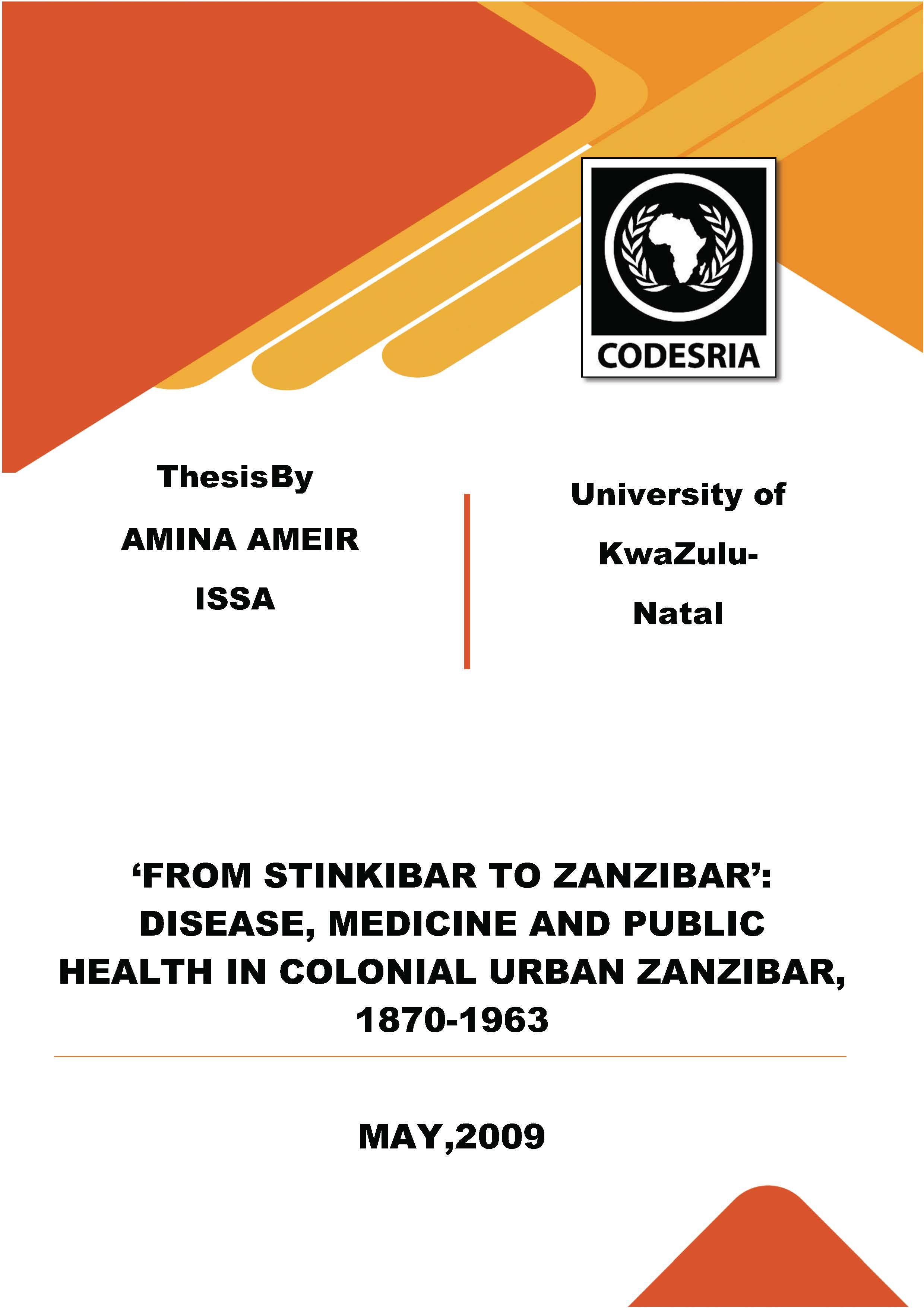From Stinkibar to Zanzibar: Disease, Medicine and Public Health in Colonial Urban Zanzibar
Keywords:
Diseases, disease control, health services, public health, epidemics, Zanzibar, South AfricaSynopsis
Until recently, scholars of Zanzibar history have not greatly focused on study the history of disease, western medicine and public health in the colonial period. This thesis covers these histories in urban Zanzibar from 1870 to 1963. In addition, it looks at the responses of the urban population to these Western-originated medical and public health facilities during the colonial period. The thesis starts by exploring history of Zanzibar Town during the nineteenth century looking at the expansion of trade and migration of people and how new pathogens were introduced. Local diseases became more serious due to population expansion. I also examine the arrival, introduction and consolidation of Western medical practices. The establishment of hospitals, the training of doctors and nurses and the extension of these facilities to the people are all discussed, as are anti-smallpox, bubonic plague, malaria and sanitation programmes before and after the Second World War. The thesis argues that the colonial government introduced medical institutions in urban Zanzibar with various motives. One of the main reasons was to control disease and ensure the health of the population. The anti-malarial, smallpox and bubonic plague campaigns are an example of how the government tackled these issues. The introduction of preventive measures was also important. The Quarantine Station, the Infectious Diseases Hospital and the Government General Hospitals were established. Other facilities were the Mental Hospitals and Leprosaria. The work of extending medical services was not only done by missionaries and the colonial state but was in great measure through the contribution of Zanzibari medical philanthropists, community, religious and political leaders. Mudiris, Shehas, family members and political parties also played a significant role. In the twentieth century, newspapers owned by individuals and political parties and community associations played a major role too. Zanzibari medical doctors, nurses, orderlies, ayahs, public health staffs were cultural brokers who facilitated the extension of biomedicine and public health measures. By the end of the British colonial rule in Zanzibar in 1963 Western medicine was an important therapeutic option for the people not only in urban Zanzibar but also in both Unguja and Pemba islands.
Downloads
References
Abdalla, I. ‘Diffusion of Islamic Medicine into Hausaland’, in S. Feierman, and J. Janzen (eds.), The Social Basis of Health and Healing in Africa (Berkeley, Los Angeles and Oxford: University of California Press, 1992).
Alexander, J. Bubonic Plague in Early Modern Russia, Public Health and Urban Disaster (Oxford: Oxford University Press, 2003).
Alpers, E. Ivory and Slaves in East and Central Africa (London: Heinemann, 1975).
Alpers, E. Campbell, G. and Salman, M. (eds). Slavery and Resistance in Africa and Asia (London: Routledge, 2005).
Amiji, H. ‘Some Notes on Religious Dissent in Nineteenth-Century East Africa’, African Historical Studies, IV, 3 (1971).
Anderson, D. and Johnson, D. ‘The Frontiers of Prophecy Healing, the Cosmos and Islam on the East African Coast in the Nineteenth Century’, in David Anderson and Douglas Johnson (eds.), Revealing Prophets, Prophecy in Eastern African History (London: James Currey, 1995).
Anderson, W. ‘Race and Acclimatization in Colonial Medicine, Immunities of Empire: Race, Disease, and the New Tropical Medicine, 1900-1920’, Bulletin of History of Medicine, 70, 1 (1996).
Anderson-Morshead, A. The History of the Universities’ Mission to Central Africa, 1933-1957 (London: Westminster, 1962).
April, D. Mercantile Adventurers: The World of East African Asians 1750-1985 (New Delhi: New Age International (P) Limited, Publishers, 1996).
Arnold, D. ‘Touching the Body: Perspectives on the Indian Plague, 1896-1900’, in R. Guha (ed.), Subaltern Studies, V (New Delhi: Oxford University Press India, 1987).
Arnold, D. ‘Introduction: Disease, Medicine and Empire’, in D. Arnold (ed.), Imperial Medicine and Indigenous Societies (Manchester and New York: Manchester University Press, 1988).
Arnold, D. (ed.), Imperial Medicine and Indigenous Societies (Manchester and New York: Manchester University Press, 1988).
the Body: State Medicine and Epidemic Disease in Nineteenth Century in India (California: California University Press, 1993).
Beck, A. History of the British Medical Administration of East Africa, 1900-1950 (Cambridg Harvard University Press, 1970).
Beck, A. ‘Medicine and Society in Tanganyika, 1890-1930: A Historical Inquiry’. Transactions of the American Philosophical Society, 67, 3 (1977).
Beck, A. Medicine, Tradition and Development in Kenya and Tanzania, 1920-1970 (Massachusetts: Crossroads Press, 1981).
Becker, A. A New Sultan Succeeds to the Throne in Zanzibar: Our Special Audience with Him, Tanganyika Notes and Records, 61 (1963) [1911].
Bell, L. Mental and Social Disorder in Sub-Saharan Africa: The Case of Sierra Leone, 1787-1990. New York, Westport and London: Greenwood Press, 1991.
Benedict, C. Bubonic Plague in Nineteenth-Century China (Stanford, California: Stanford University Press, 1996).
Bennett, N (ed.), ‘From Zanzibar to Ujiji, the Journal of Arthur Dodgshun, 1877-1879’ (African Studies Center, Boston University, 1969).
Bennett, N. ‘France and Zanzibar, 1844 to the 1860s’, International Journal of African Historical Studies, 6, 4 (1973).
Bennett, N. A History of the Arab State of Zanzibar (London: Methuen & Co Ltd, 1978). BERLA, ‘Leprosy in Africa’, Tropical Diseases Bulletin (August, 1934).
Bey, R. The Awakening of Modern Egypt (London & Toronto: Longmans, Green & Company, 1946).
Bharati. A. The Asians in East Africa (Chicago: Nelson- Hall Coy. Publisher, 1972).
Bissell, W. ‘Conservation and the Colonial Past, Urban Planning, Space and Power in Zanzibar’, in D. Anderson and R. Rathbone (eds.), Africa’s Urban Past (London: Heinemann, 2000).
Brock, T. Robert Koch A Life in Medicine and Bacteriology (Madison: Science Tech Publishers, 1988).
Bruchhausen, W. ‘“Practising Hygiene and Fighting the Natives’ Diseases”, Public and Child Health in German East Africa and Tanganyika Territory, 1900-1960’, Dynamis, 23 (2003).
Healing Power and Destruction, Intrusion into the Human Body in Eastern Africa’s Medicine’, Wurzbg Medizinhist Mitt, 24 (2005).






